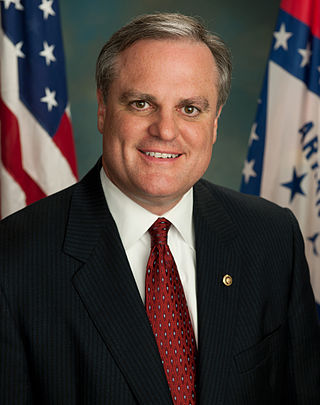
Mark Lunsford Pryor is an American attorney, politician and lobbyist who served as a United States Senator from Arkansas from 2003 to 2015. He previously served as Attorney General of Arkansas from 1999 to 2003 and in the Arkansas House of Representatives from 1991 to 1995. He is a member of the Democratic Party.

The Authorization for Use of Military Force Against Iraq Resolution of 2002, informally known as the Iraq Resolution, is a joint resolution passed by the United States Congress in October 2002 as Public Law No. 107-243, authorizing the use of the United States Armed Forces against Saddam Hussein's Iraq government in what would be known as Operation Iraqi Freedom.

John William Warner III was an American lawyer and politician who served as the United States Secretary of the Navy from 1972 to 1974 and as a five-term Republican U.S. Senator from Virginia from 1979 to 2009. He served as chairman of the Senate Armed Services Committee from 1999 to 2001, and from 2003 to 2007. Warner also served as the chairman of the Senate Rules Committee from 1995 to 1999.

Maria Ellen Cantwell is an American politician and former businesswoman serving as the junior United States senator from Washington since 2001. A member of the Democratic Party, she served in the Washington House of Representatives from 1987 to 1993, and in the United States House of Representatives from Washington's 1st congressional district from 1993 to 1995.

Carl Milton Levin was an American attorney and politician who served as a United States senator from Michigan from 1979 to 2015. A member of the Democratic Party, he was the chair of the Senate Armed Services Committee from 2001 to 2003 and again from 2007 to 2015.
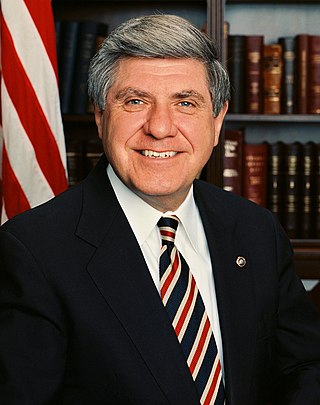
Earl Benjamin Nelson is an American attorney, businessman, and politician who served as the 37th governor of Nebraska from 1991 to 1999 and as a United States Senator from Nebraska from 2001 to 2013. He is a member of the Democratic Party, and as of 2024, is the last Democrat to hold and/or win any statewide elected office in Nebraska.

Charles Timothy Hagel is an American military veteran and former politician who served as the 24th United States secretary of defense from 2013 to 2015 in the administration of Barack Obama. He previously served as chairman of the president's Intelligence Advisory Board from 2009 to 2013 and as a United States senator representing Nebraska from 1997 to 2009.
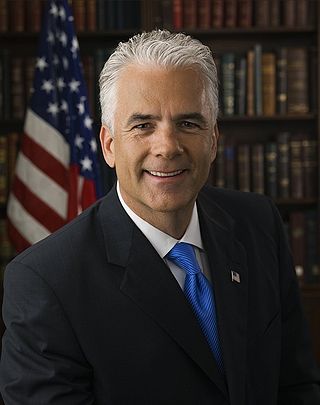
John Eric Ensign is an American veterinarian and former politician who served as a United States Senator from Nevada from 2001 until his resignation in 2011 amid a Senate Ethics Committee investigation into his attempts to hide an extramarital affair. A member of the Republican Party, Ensign previously represented Nevada's 1st congressional district in the House of Representatives from 1995 to 1999. Following his resignation from the Senate, Ensign returned to Nevada and resumed his career as a veterinarian.
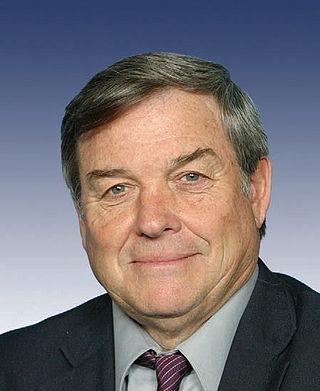
Duncan Lee Hunter is an American politician. He was a Republican member of the House of Representatives from California's 52nd, 45th and 42nd districts from 1981 to 2009.

David Bruce Vitter is an American politician, attorney, and lobbyist who served as a United States Senator from Louisiana from 2005 to 2017. A member of the Republican Party, Vitter served in the Louisiana House of Representatives from 1992 to 1999 and in the U.S. House of Representatives from 1999 to 2005.

The withdrawal of the United States troops from Iraq began in December 2007 with the end of the Iraq War troop surge of 2007 and was mostly completed by December 2011, bringing an end to the Iraq War. The number of U.S. military forces in Iraq peaked at 170,300 in November 2007.

The 2004 United States presidential election was the 55th quadrennial presidential election, held on Tuesday, November 2, 2004. The Republican ticket of incumbent President George W. Bush and his running mate incumbent Vice President Dick Cheney was re-elected to a second term. They narrowly defeated the Democratic ticket of John Kerry, a senator from Massachusetts, and his running mate John Edwards, a senator from North Carolina.

Joseph Simon Donnelly Sr. is an American attorney, politician, and diplomat who served in the U.S. House of Representatives from 2007 to 2013 and as a U.S. Senator from 2013 to 2019. A Democrat from Indiana, he later served as the United States Ambassador to the Holy See from 2022 to 2024 under President Joe Biden.
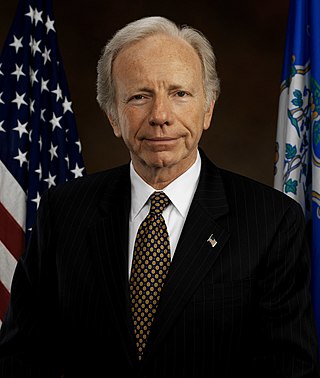
Joe Lieberman was an American politician who served as a United States Senator from Connecticut from 1989 to 2013. A former member of the Democratic Party, he was the party's nominee for Vice President in the 2000 election. He was an Independent prior to his death.

The United States Senate career of Hillary Rodham Clinton began when she defeated Republican Rick Lazio in the 2000 United States Senate election in New York. She was elected to a second term in 2006. Clinton resigned from the Senate on January 21, 2009, to become United States Secretary of State for the Obama Administration.

The history of the USA PATRIOT Act involved many parties who opposed and supported the Patriot Act, which was proposed, enacted and signed into law 45 days after the September 11 terrorist attacks in 2001. The legislation, though approved by large majorities in the U.S. Senate and House of Representative, was controversial, and parts of the law were invalidated or modified by successful legal challenges over constitutional infringements to civil liberties. The Act had several sunset provisions, most reauthorized by the USA PATRIOT Improvement and Reauthorization Act of 2005 and the USA PATRIOT Act Additional Reauthorizing Amendments Act. Both reauthorizations incorporated amendments to the original USA PATRIOT Act, and other federal laws.
The political positions of Norm Coleman have changed dramatically over his career. Originally a Democrat and an anti-war activist as a university student during the Vietnam War, Coleman has since switched parties and is now generally considered a moderate Republican.

The 2004 presidential campaign of Joe Lieberman, the long-time United States senator from Connecticut and the vice-presidential nominee under Al Gore in the previous election, began on January 13, 2003, when he announced his intention to seek the Democratic nomination as a candidate in the 2004 presidential election. Describing his presidential hopes, Lieberman opined that his historically hawkish stance would appeal to voters. Prior to his defeat in New Hampshire, Lieberman famously declared his campaign was picking up "Joementum". On February 3, 2004, Lieberman withdrew his candidacy after failing to win any of the five primaries or two caucuses held that day. He acknowledged to the Hartford Courant that his support for the war in Iraq was a large part of his undoing with voters. Lieberman's former running candidate Al Gore did not support Lieberman's presidential run, and in December 2003 endorsed Howard Dean's candidacy, saying "This is about all of us and all of us need to get behind the strongest candidate [Dean]."
This article compares the presidential candidates in the United States' 2008 presidential election. It does not cover previous elections. Because of ballot access restrictions in the United States, not all candidates appeared on the ballots in all states.

The Kyl–Lieberman Amendment was an amendment to H.R.1585 – the National Defense Authorization Act for Fiscal Year 2008, which subsequently became a 2008 presidential election campaign issue. Its purpose was to "express the sense of the Senate regarding Iran", and mainly stated that: "it should be the policy of the United States to combat...the violent activities...inside Iraq of the Government of the Islamic Republic of Iran", and "its foreign facilitators such as Lebanese Hezbollah"; "to support the...use of all instruments of United States national power in Iraq...in support of the policy described"; and "with respect to the government of the Islamic Republic of Iran and its proxies", that the "United States should designate the Islamic Revolutionary Guards Corps as a foreign terrorist organization".















